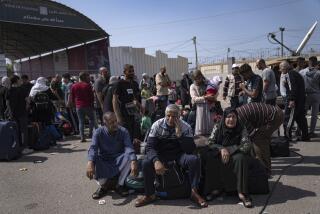Iraq bars major Sunni party from election
In a development that bodes ill for the prospects of national reconciliation in Iraq, a prominent Sunni party has been barred from participating in March elections because of its leader’s alleged ties to the outlawed Baath Party that ruled the country under Saddam Hussein, officials said Thursday.
The decision could have significant ramifications for a general election that U.S. officials hope will stabilize Iraq enough for American troops to withdraw in large numbers and leave behind a peaceful country.
The Justice and Accountability Committee charged with checking that candidates don’t have ties to Baathists has named Saleh Mutlak, a prominent lawmaker, among those disqualified from the elections, according to the panel’s executive director, Ali Lami.
That means that Mutlak’s Iraqi Dialogue Front also will be barred, said Lami, who was detained by the U.S. military for a year on suspicion of ties to Iranian-backed militias.
Mutlak had been cleared for participation in the last election, in December 2005, but Lami said that new information had come to light that showed Mutlak “is a Baathist and nominated himself as a Baathist.” He declined to provide further details.
Mutlak, who is regarded as a leading spokesman for disgruntled Sunni Muslims and secularists who wish to participate in the political process, dismissed the allegation as “absolute rubbish.”
“How could I nominate myself as a Baathist when I know that it is illegal? I am wiser than that,” he said.
Mutlak acknowledged that he had sympathies for those who served under the former regime and feel they have been discriminated against since the U.S.-led invasion in 2003.
“Sympathy is different,” he said. “I sympathize with all the oppressed people in Iraq, and the Baathists have been oppressed in a big way.”
Sunni politicians allied with Mutlak planned to meet today to discuss their response. Some of them did not rule out boycotting the election, which could plunge the country back into civil conflict, echoing the boycott by the Sunni minority during the first democratic election in January 2005.
“This is a very big setback for the political process,” said Osama Nujaifi, head of the hard-line nationalist Iraqi National Gathering group, which had planned to run with Mutlak in a broad coalition opposed to the ruling Shiite Islamist parties. “It shuts the door in the face of national reconciliation.”
Mutlak’s allies hope to find a way to persuade the government to override the ban, Nujaifi said. That sets the stage either for protracted negotiations that risk delaying the election -- already pushed back from January because of squabbles among politicians -- or for another Sunni boycott that would once again polarize the country along sectarian lines, political analyst Wamidh Nadhmi said.
“If the Americans do not intervene to change this decision, perhaps there will be no election at all, or at least all of the so-called Sunni lists will withdraw from the elections,” he said.
Though Mutlak can’t claim broad national support, he is widely seen as the leading representative of a particular political trend that regards itself as nonsectarian and opposed to the Shiite religious parties that run the government. He characterizes himself as a staunch secularist who was a Baathist but quit in the late 1970s.
In 2005, Mutlak was widely rumored to have ties to Sunni fighters, and U.S. officials encouraged his participation in the political process because they saw him as a bridge to the insurgency.
Mutlak’s party, which won 11 seats in the last election, probably would not have won many seats in the March elections, Nadhmi said. But with the Shiite vote expected to split between Prime Minister Nouri Maliki’s State of Law coalition and the Iraqi National Alliance, Mutlak’s bloc could have played a leading role in determining who the next prime minister will be.
Under a 2008 law pushed by U.S. officials in an effort to promote reconciliation, the Justice and Accountability Committee replaced the De-Baathification Committee established by the U.S. occupation authority. But many Iraqis, including Mutlak, say the new committee’s provisions are even more draconian and will probably work to deter reconciliation.
Lami headed the old committee, and kept his job after his release from U.S. custody because parliament has been unable to agree on a replacement.
Times staff writer Caesar Ahmed contributed to this report.
More to Read
Start your day right
Sign up for Essential California for news, features and recommendations from the L.A. Times and beyond in your inbox six days a week.
You may occasionally receive promotional content from the Los Angeles Times.






